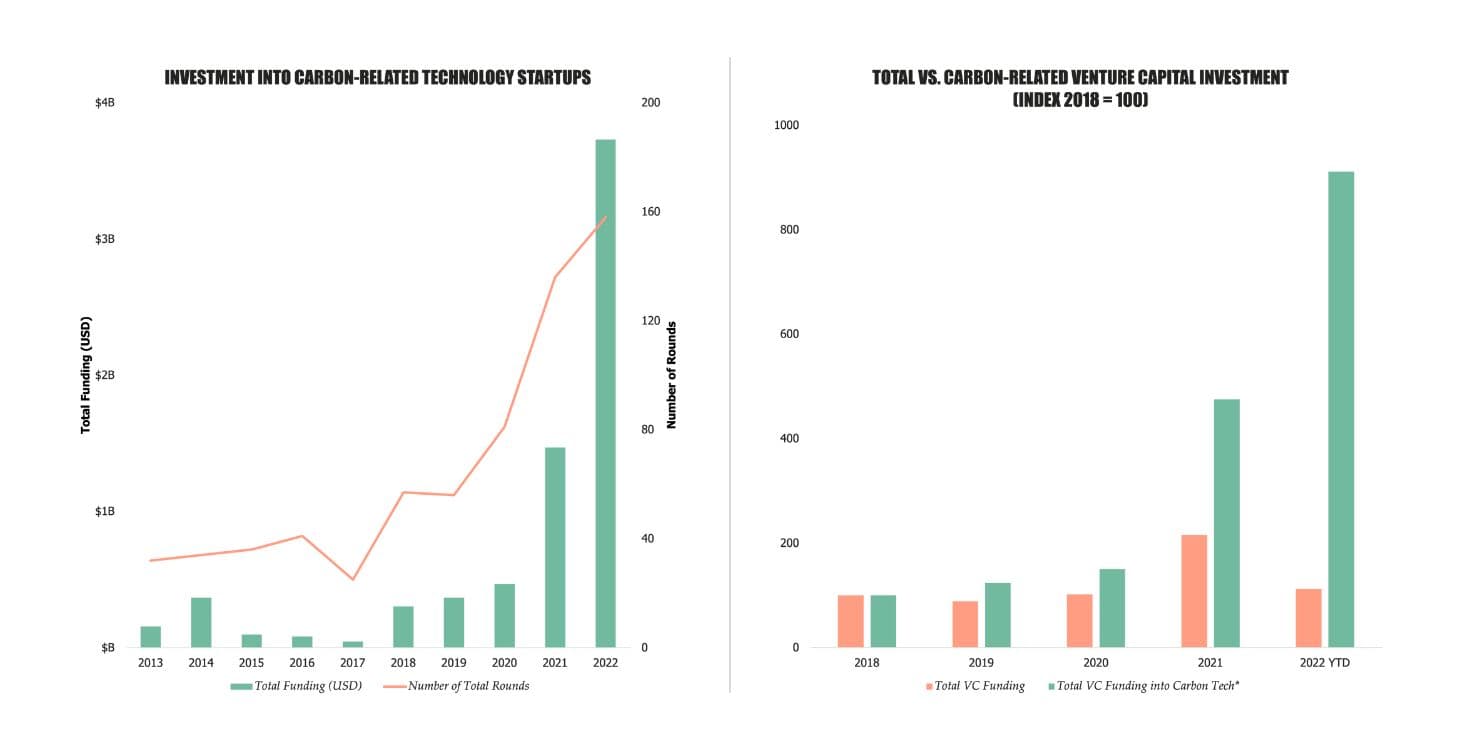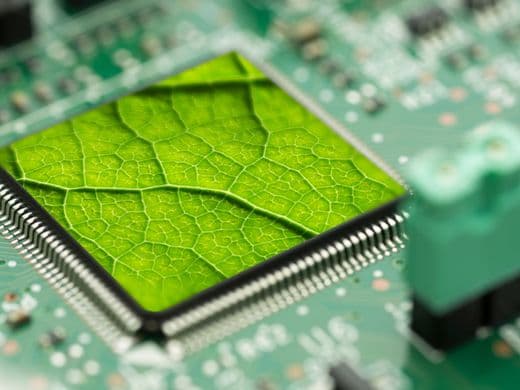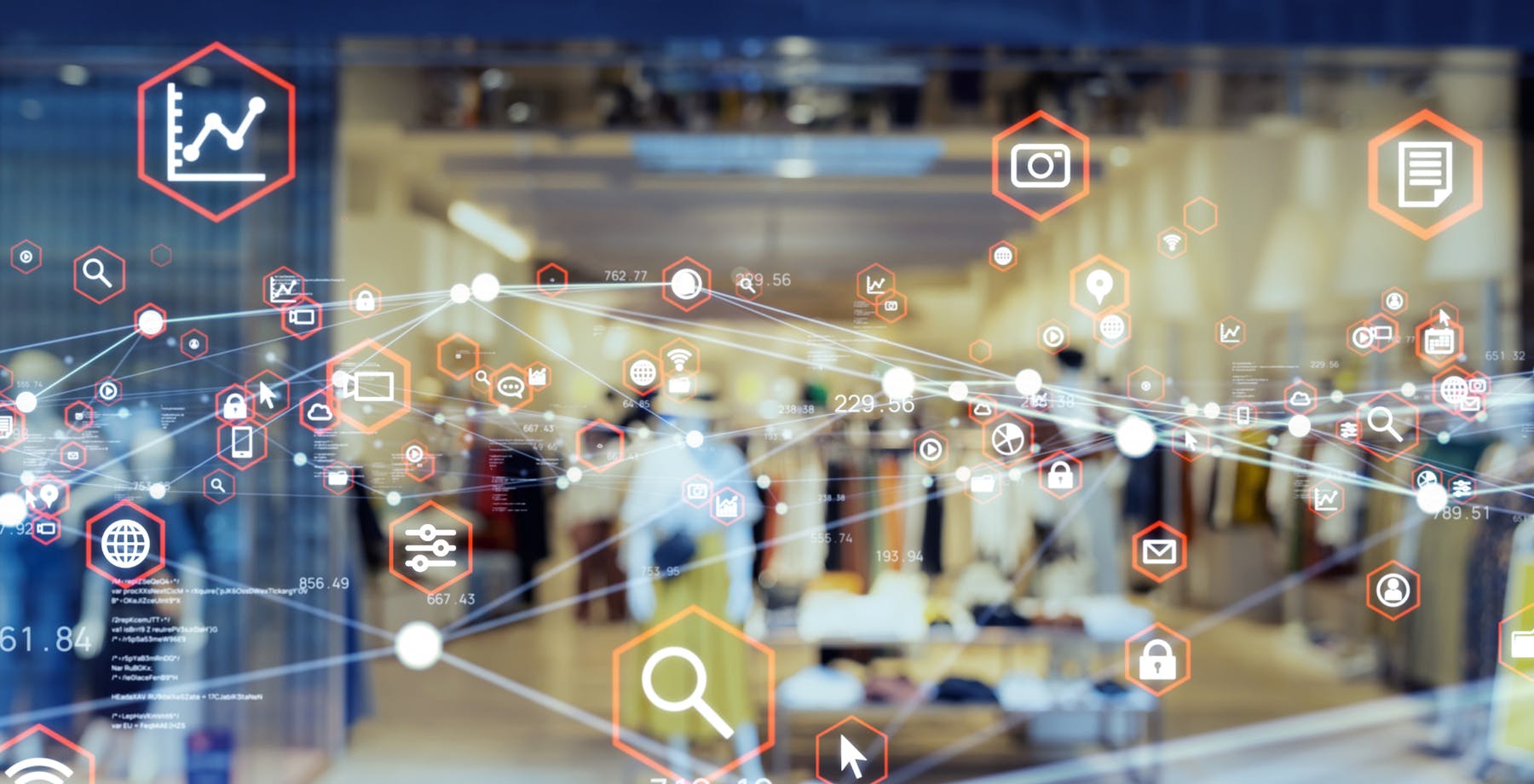As outlined in the first part of our climate challenge blog series, emerging business models and innovative technology will play a key role in the decarbonisation of the retail industry. Evidently, technology – either developed or nascent – will not be able to solve everything. Successfully reducing our environmental impact will require extensive behaviour change from consumers, transformation of existing operating models and unparalleled collaboration with suppliers.
The belief that technology can drive meaningful change in the fight against climate change is possibly best encapsulated by the amount of early-stage capital being raised and deployed into carbon-related technology businesses. This has increased dramatically in recent years with a total of £1.5bn venture funding in 2021 and showing no signs of slowing up. Indeed, there was a 148% increase in 2022 [Tracxn], which is even more remarkable in the context of a 48% fall in Venture Capital (VC) funding overall.

As with any sudden acceleration of capital into a certain area, some of these technologies are unlikely to live up to their current expectations or forecast rate of adoption.
While this rapid acceleration in funding of climate-tech businesses may remind many of the fall of the CleanTech bubble, the narrative has shifted away from inflated optimism of consumer behaviour, unscalable technology and weak returns. This has been reflected across consumers, governments and businesses. For example, 60% of young people feel worried about the coming climate crisis. In the US, the Inflation Reducation Act allocates more than $370bn in incentives and programmes to accelerate action on climate and energy over the next decade. Across governments, a growing desire to be less dependent on fossil fuels has contributed to growth, spurred on by Russia’s invasion of Ukraine. So, even though it may seem that the rise of climate tech is a bubble, the flows of capital combined with developed consumer and institutional attitudes provide a fertile ground for opportunities for growth.
The climate startup ecosystem is already large and complex, covering a vast range of themes. Some are relatively well-developed and funded, while others are only just emerging and will require time and capital before reaching scalability. Some of the most notable and interesting at this stage include carbon sequestration and transformation, green energy, and advanced materials for products and packaging.
Carbon Sequestration and Transformation
Carbon sequestration is the capturing, removal and storage of carbon dioxide from the earth’s atmosphere. This can slow, limit or even reverse climate change, but it is not a substitute for cutting greenhouse gas emissions. Within this space, carbon transformation is a growing area. This turns waste carbon dioxide into valuable resources such as concrete, plastics and even jet fuel. One example company is Twelve, a carbon transformation company producing fuels and materials which can be applied across the supply chain from transport to raw materials. Its collaboration with Pangaia created sunglasses with lenses made from CO2; a great example of how brands can go beyond the traditional confines of carbon sequestration and take part in driving innovation in future materials.
Green Energy
Green energy is any energy type that is generated from natural resources, such as sunlight, wind or water and doesn’t harm the environment through the release of greenhouse gases. Key sources of green energy such as solar, wind and wave have all experienced significant falls in price over the last decade due to vast capital inflows during the previous CleanTech bubble. The current surge in investment is likely to have a similar positive effect on other forms of green energy. Eco Wave Power draws clean energy from waves through floaters on man-made structures. With the rest of the equipment on land, the company provides a cheaper and more reliable alternative to wave energy providers. The proliferation of green energy and the continual fall in its price will be a significant factor enabling governments and corporations to progress towards their net-zero goals successfully.
Advanced Materials
Advanced materials are alternative materials which reduce the environmental impact but offer the same or superior performance. An example of the innovation taking place would be in the proliferation of bioplastics. Plastic is one of the most ubiquitous manufactured materials on earth and one of the most unsustainable; plastics manufacturing makes up 3.4% of global CO2 emissions. Companies are innovating from the molecule up to imagine more sustainable versions of these materials. One example is Notpla, a UK-based startup, making packaging from seaweed and plants, replacing single-use plastic with materials that naturally biodegrade. Across the retail sector, there has been a definitive willingness by corporates to invest and employ advanced materials across their supply chains.
As the severity of the climate crisis increases, so does the size of the response from entrepreneurs, companies and capital allocators; providing a much-needed antidote to the complexity around this topic. If you would like to better understand how technology and innovation can help you to decarbonise and meet your net-zero targets, please don’t hesitate to reach out to one of the Innovation team here at True.


